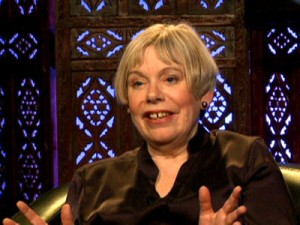Historian and former nun Karen Armstrong says the afterlife is a “red herring,” hating religion is a pathology and that many Westerners cling to infantile ideas of God.
 BY STEVE PAULSON: Karen Armstrong is a one-woman publishing industry, the author of nearly 20 books on religion. When her breakthrough book “A History of God” appeared in 1993, this British writer quickly became known as one of the world’s leading historians of spiritual matters. Her work displays a wide-ranging knowledge of religious traditions — from the monotheistic religions to Buddhism. What’s most remarkable is how she carved out this career for herself after rejecting a life in the church.
BY STEVE PAULSON: Karen Armstrong is a one-woman publishing industry, the author of nearly 20 books on religion. When her breakthrough book “A History of God” appeared in 1993, this British writer quickly became known as one of the world’s leading historians of spiritual matters. Her work displays a wide-ranging knowledge of religious traditions — from the monotheistic religions to Buddhism. What’s most remarkable is how she carved out this career for herself after rejecting a life in the church.
At 17, Armstrong became a Catholic nun. She left the convent after seven years of torment. “I had failed to make a gift of myself to God,” she wrote in her recent memoir, “The Spiral Staircase.” While she despaired over never managing to feel the presence of God, Armstrong also bristled at the restrictive life imposed by the convent, which she described in her first book, “Through the Narrow Gate.” When she left in 1969, she had never heard of the Beatles or the Vietnam War, and she’d lost her faith in God.
Armstrong went on to work in British television, where she became a well-known secular commentator on religion. Then something strange happened. After a TV project fell apart, she rediscovered religion while working on two books, “A History of God” and a biography of Mohammed. Her study of sacred texts finally gave her the appreciation of religion she had longed for — not religion as a system of belief, but as a gateway into a world of mystery and the ineffable. “Muhammad: A Biography of the Prophet” also made her one of Europe’s most prominent defenders of Islam.
Armstrong now calls herself a “freelance monotheist.” It’s easy to understand her appeal in today’s world of spiritual seekers. As an ex-nun, she resonates with people who’ve fallen out with organized religion. Armstrong has little patience for literal readings of the Bible, but argues that sacred texts yield profound insights if we read them as myth and poetry. She’s especially drawn to the mystical tradition, which — in her view — has often been distorted by institutionalized religion. While her books have made her enormously popular, it isn’t surprising that she’s also managed to raise the ire of both Christian fundamentalists and atheists.
In her recent book, “The Great Transformation,” Armstrong writes about the religions that emerged during the “Axial Age,” a phrase coined by the German philosopher Karl Jaspers. This is the era when many great sages appeared, including the Buddha, Socrates, Confucius, Jeremiah and the mystics of the Upanishads. I interviewed Armstrong in the middle of her grueling American book tour. She dislikes flying in small airplanes, so her publisher hired a car service to drive her from Minnesota to Wisconsin, where I spoke with her before she met with a church group. When she got out of her car, I was greeted by a rather short and intense woman, somewhat frazzled by last-minute interview requests. But once settled, her passion for religion came pouring out. She was full of surprises. Armstrong dismissed the afterlife as insignificant, and drew some intriguing analogies: Just as there’s good and bad sex and art, there’s good and bad religion. Religion, she says, is hard work.
Why are you so interested in the Axial Age?
Because it was the pivot, or the axis, around which the future spiritual development of humanity has revolved. We’ve never gone beyond these original insights. And they have so much to tell us today because very often in our religious institutions we are producing exactly the kind of religiosity that people such as the Buddha wanted to get rid of. While I was researching this book, they seemed to be talking directly to us in our own troubled time.
What religions emerged during the Axial Age?
From about 900 to 200 BCE, the traditions that have continued to nourish humanity either came into being or had their roots in four distinct regions of the world. So you had Confucianism and Taoism in China; Hinduism, Buddhism, Jainism in India; monotheism in Israel; and philosophical rationalism in Greece.
You’re saying all these different religions developed independently of each other. But there was a common message that emerged roughly around the same time.
Yes. Without any collusion, they all came up with a remarkably similar solution to the spiritual ills of humanity. Before the Axial Age, religions had been very different. They had been based largely on external rituals which gave people intimations of greatness. But there was no disciplined introspection before the Axial Age. The Axial sages discovered the inner world. And religions became much more spiritualized because humanity had taken a leap forward. People were creating much larger empires and kingdoms than ever before. A market economy was in its very early stages. That meant the old, rather parochial visions were no longer adequate. And these regions were torn apart by an unprecedented crescendo of violence. In every single case, the catalyst for religious change had been a revulsion against violence.
So what was the spiritual message that rejected violence?
First of all, they all insisted that you must give up and abandon your ego. The sages said the root cause of suffering lay in our desperate concern with self, which often needs to destroy others in order to preserve itself. And so they insisted that if we stepped outside the ego, then we would encounter what we call Brahman or God, nirvana or the Tao.
You say one of the common messages in all these religions was what we now call the Golden Rule. And Confucius was probably the first person who came up with this idea.
All these sages, with the exception of the Greeks, posited a counter-ideology to the violence of their time. The safest way to get rid of egotism was by means of compassion. The first person to promulgate the Golden Rule, which was the bedrock of this empathic spirituality, was Confucius 500 years before Christ. His disciples asked him, “What is the single thread that runs through all your teaching and pulls it all together?” And Confucius said, “Look into your own heart. Discover what it is that gives you pain. And then refuse to inflict that pain on anybody else.” His disciples also asked, “Master, which one of your teachings can we put into practice every day?” And Confucius said, “Do not do to others as you would not have them do to you.” The Buddha had his version of the Golden Rule. Jesus taught it much later. And Rabbi Hillel, the older contemporary of Jesus, said the Golden Rule was the essence of Judaism.
Now, there is the question of whether all of these were actually religions. I mean, the philosophies of the ancient Greeks — Socrates and Plato — were not religious at all. Buddhism is essentially a philosophy of mind. And I suppose you could see Confucianism as essentially a system of ethics.
That’s a very chauvinistic Western view, if I may say so. You’re saying this is what we regard as religion, and anything that doesn’t measure up to that isn’t. I think a Buddhist or a Confucian would be very offended to hear that he or she was not practicing a religion.
Well, explain that. What is religion?
Religion is a search for transcendence. But transcendence isn’t necessarily sited in an external god, which can be a very unspiritual, unreligious concept. The sages were all extremely concerned with transcendence, with going beyond the self and discovering a realm, a reality, that could not be defined in words. Buddhists talk about nirvana in very much the same terms as monotheists describe God.
That’s fascinating. So in Buddhism, which is nontheistic, the message or the experience of nirvana is the same as the Christian God?
The experience is the same. The trouble is that we define our God too closely. In my book “A History of God,” I pointed out that the most eminent Jewish, Christian and Muslim theologians all said you couldn’t think about God as a simple personality, an external being. It was better to say that God did not exist because our notion of existence was far too limited to apply to God.
Didn’t a lot of people say God is beyond language? We could only experience the glimmer of God.
That’s what the Buddha said. You can’t define nirvana, you can’t say what it is. The Buddha also said you could craft a new kind of human being in touch with transcendence. He was once asked by a Brahman priest who passed him in contemplation and was absolutely mesmerized by this man sitting in utter serenity. He said, “Are you a god, sir? Are you an angel or a spirit?” And the Buddha said, “No, I’m awake.” His disciplined lifestyle had activated parts of his humanity that ordinarily lie dormant. But anybody could do it if they trained hard enough. The Buddhists and the Confucians and the greatest monotheistic mystics did with their minds and hearts what gymnasts and dancers do with their bodies.
You’re saying these ancient sages really didn’t care about big metaphysical systems. They didn’t care about theology.
No, none of them did. And neither did Jesus. Jesus did not spend a great deal of time discoursing about the trinity or original sin or the incarnation, which have preoccupied later Christians. He went around doing good and being compassionate. In the Quran, metaphysical speculation is regarded as self-indulgent guesswork. And it makes people, the Quran says, quarrelsome and stupidly sectarian. You can’t prove these things one way or the other, so why quarrel about it? The Taoists said this kind of speculation where people pompously hold forth about their opinions was egotism. And when you’re faced with the ineffable and the indescribable, they would say it’s belittling to cut it down to size. Sometimes, I think the way monotheists talk about God is unreligious.
Unreligious? Like talk about a personal God?
Yes, people very often talk about him as a kind of acquaintance, whom they can second-guess. People will say God loves that, God wills that, and God despises the other. And very often, the opinions of the deity are made to coincide exactly with those of the speaker.
Yet we certainly see a personal God in various sacred texts. People aren’t just making that up.
No, but the great theologians in Judaism, Christianity and Islam say you begin with the idea of a god who is personal. But God transcends personality as God transcends every other human characteristic, such as gender. If we get stuck there, this is very immature. Very often people hear about God at about the same time as they’re learning about Santa Claus. And their ideas about Santa Claus mature and change in time, but their idea of God remains infantile.
What about the supernatural, though? Do you need any sense of the miraculous or of things that cannot be explained by science?
I think religions hold us in an attitude of awe and wonder. People such as the Buddha thought miracles were rather vulgar — you know, displays of power and ego. If you look at the healing miracles attributed to Jesus, they generally had some kind of symbolic aspect about healing the soul rather than showing off a supernatural power. Western people think the supernatural is the essence of religion, but that’s rather like the idea of an external god. That’s a minority view worldwide. I really get so distressed on behalf of Buddhists and Confucians and Hindus to have a few Western philosophers loftily dismissing their religion as not religious because it doesn’t conform to Western norms. It seems the height of parochialism.
I think these questions are tremendously important now because more and more people, especially those with a scientific bent, say we don’t need religion anymore. Science has replaced religion. You know, religion used to explain all kinds of things about the world. But science for the most part does that now. And people who are not religious say they can be just as morally upright.
They can. I fully endorse that. I don’t think you need to believe in an external god to obey the Golden Rule. In the Axial Age, when people started to concentrate too much on what they’re transcending to — that is, God — and neglected what they’re transcending from — their greed, pompous egotism, cruelty — then they lost the plot, religiously. That’s why God is a difficult religious concept. I think God is often used by religious people to give egotism a sacred seal of divine approval, rather than to take you beyond the ego.
As for scientists, they can explain a tremendous amount. But they can’t talk about meaning so much. If your child dies, or you witness a terrible natural catastrophe such as Hurricane Katrina, you want to have a scientific explanation of it. But that’s not all human beings need. We are beings who fall very easily into despair because we’re meaning-seeking creatures. And if things don’t add up in some way, we can become crippled by our despondency.
So would you say religion addresses those questions through the stories and myths?
Yes. In the pre-modern world, there were two ways of arriving at truth. Plato, for example, called them mythos and logos. Myth and reason or science. We’ve always needed both of them. It was very important in the pre-modern world to realize these two things, myth and science, were complementary. One didn’t cancel the other out.
Well, what do you say to the scientists, especially the Darwinists — Richard Dawkins would be the obvious case — who are quite angry about religion? They say religion is the root of much evil in the world. Wars are fought and fueled by religion. And now that we’re in the 21st century, they say it’s time that science replace religion.
I don’t think it will. In the scientific age, we’ve seen a massive religious revival everywhere but Europe. And some of these people — not all, by any means — seem to be secular fundamentalists. They have as bigoted a view of religion as some religious fundamentalists have of secularism. We have too much dogmatism at the moment. Take Richard Dawkins, for example. He did a couple of religious programs that I was fortunate enough to miss. It was a very, very one-sided view.
Well, he hates religion.
Yeah, this is not what the Buddha would call skillful. If you’re consumed by hatred — Freud was rather the same — then this is souring your personality and clouding your vision. What you need to do is to look appraisingly and calmly on other traditions. Because when you hate religion, it’s also very easy to hate the people who practice it.
This does raise the question, though, of how to read the sacred scriptures.
Indeed.
Because there are all kinds of inflammatory things that are said. For instance, many passages in both the Bible and the Quran exhort the faithful to kill the infidels. Sam Harris, in his book “The End of Faith,” has seven very densely packed pages of nothing but quotations from the Quran with just this message. “God’s curse be upon the infidels”; “slay them wherever you find them”; “fighting is obligatory for you, much as you dislike it.” And Sam Harris’ point is that the Muslim suicide bombings are not the aberration of Islam. They are the message of Islam.
Well, that’s simply not true. He’s taken parts of those texts and omitted their conclusions, which say fighting is hateful for you. You have to do it if you’re attacked, as Mohammed was being attacked at the time when that verse was revealed. But forgiveness is better for you. Peace is better. But when we’re living in a violent society, our religion becomes violent, too. Religion gets sucked in and becomes part of the problem. But to isolate these texts as though they expressed the whole of the tradition is very mischievous and dangerous at this time when we are in danger of polarizing people on both sides. And this kind of inflammatory talk, say about Islam, is convincing Muslims all over the world who are not extremists that the West is incurably Islamophobic and will never respect their traditions. I think it’s irresponsible at this time.
But many people would say you can’t just pick out the peaceful and loving passages of the sacred scriptures. There are plenty of other passages that are frightening.
I would say there are more passages in the Bible than the Quran that are dedicated to violence. I think what all religious people ought to do is to look at their own sacred traditions. Not just point a finger at somebody else’s, but our own. Christians should look long and hard at the Book of Revelation. And they should look at those passages in the Pentateuch that speak of the destruction of the enemy. They should make a serious study of these. And let’s not forget that in its short history, secularism has had some catastrophes.
Certainly, the major tragedies of the 20th century were committed by secularists — Stalin, Hitler, Mao.
And Saddam Hussein, a secularist supported by us in the West for 10 years, even when he gassed the Kurds. We supported him because he was a secularist. If people are resistant to secularism in Iraq now, it’s because their most recent experience of it was Saddam. So this kind of chauvinism that says secularism is right, religion is all bunk — this is one-sided and I think basically egotistic. People are saying my opinion is right and everybody else’s is wrong. It gets you riled up. It gives you a sense of holy righteousness, where you feel frightfully pleased with yourself when you’re sounding off, and you get a glorious buzz about it. But I don’t see this as helpful to humanity. And when you suppress religion and try and get rid of it, then it’s likely to take unhealthy forms.
That’s when fundamentalism starts to appear.
Yes, because fundamentalism has developed in every single one of the major traditions as a response to secularism that has been dismissive or even cruel, and has attempted to wipe out religion. And if you try to repress it — as happened in the Soviet Union — there’s now a huge religious revival in the Soviet Union, and some of it’s not very healthy. It’s like the suppression of the sexual instinct. If you repress the sexual instinct and try to tamp it down, it’s likely to develop all kinds of perverse and twisted forms. And religion’s the same.
Well, it seems to me you’re also saying that to be religious — truly religious — is tremendously hard work. It’s far harder than just …
… singing a few hymns.
… or just reading the scriptures literally. You can’t live that way.
Religion is hard work. It’s an art form. It’s a way of finding meaning, like art, like painting, like poetry, in a world that is violent and cruel and often seems meaningless. And art is hard work. You don’t just dash off a painting. It takes years of study. I think we expect religious knowledge to be instant. But religious knowledge comes incrementally and slowly. And religion is like any other activity. It’s like cooking or sex or science. You have good art, sex and science, and bad art, sex and science. It’s not easy to do it well.
So how should we approach the sacred texts? How should we read them?
Sacred texts have traditionally been a bridge to the divine. They’re all difficult. They’re not a simple manual — a how-to book that will tell you how to gain enlightenment by next week, like how to lose weight on the Atkins diet. This is a slow process. I think the best image for reading scripture occurs in the story of Jacob, who wrestles with a stranger all night long. And in the morning, the stranger seems to have been his God. That’s when Jacob is given the name Israel — “one who fights with God.” And he goes away limping as he walks into the sunrise. Scriptures are a struggle.
Is faith a struggle?
Well, faith is not a matter of believing things. That’s again a modern Western notion. It’s only been current since the 18th century. Believing things is neither here nor there, despite what some religious people say and what some secularists say. That is a very eccentric religious position, current really only in the Western Christian world. You don’t have it much in Judaism, for example.
But it’s not surprising that religion has become equated with belief because these are the messages we hear as we grow up, regardless of our faiths.
We hear it from some of them. And I think we’ve become rather stupid in our scientific age about religion. If you’d presented some of these literalistic readings of the Bible to people in the pre-modern age, they would have found it rather obtuse. They’d have found it incomprehensible that people really believe the first chapter of Genesis is an account of the origins of life.
So how should we read the story of creation in Genesis?
Well, it’s not a literal account because it’s put right next door to another account in Chapter 2, which completely contradicts it. Then there are other creation stories in the Bible that show Yahweh like a Middle Eastern god killing a sea monster to create the world. Cosmogony in the ancient world was not an account of the physical origins of life. Cosmogony was usually used therapeutically. When people were sick or in times of vulnerability, they would read a cosmogony in order to get an influx of the divine, to tap into those extraordinary energies that had created something out of nothing.
That seems to be a question that scientists are struggling with now. Did the big bang come out of nothing?
Exactly. And I think some scientists are writing a new kind of religious discourse, teaching us to pit ourselves against the dark world of uncreated reality and pushing us back to the mysterious. They’re resorting to mythological imagery: Big Bang, black hole. They have all kinds of resonances because this is beyond our ken.
I’m curious about how these issues have played out in your own life because you went into a convent at a rather young age — at 17. You lived there for seven years. You’ve written about how you tried to find God but couldn’t. And you left in despair. I don’t know if you called yourself an atheist, but you were certainly close to that. And then, as you worked on your book, “A History of God,” you seemed to discover something that you hadn’t known before.
I couldn’t get on with religion in the convent because it was a very unkind institution. I limped away from it. I wanted nothing to do with religion ever again, but came back to it through the study of other religious traditions — initially, Judaism and Islam. Later, Buddhism, Hinduism and Confucianism.
So it was actually studying the history and the texts that allowed you to enter into the religious experience.
Yes, once I’d stopped prancing and posturing around on TV, where I was expected to have an inflammatory opinion and to let people have it. All this was pure egotism. I did some early television programs and expressed my secularism very cleverly. I’m slightly down on cleverness, which can be fun and witty at a dinner party and I enjoy that as much as anybody else. But it can be superficial. Once my television career had folded, I was left on my own with these texts. There was nobody to exclaim derisively about the irrationality of a Greek Orthodox text or the stupidity of a certain Jewish mysticism. I began to read them like poetry, which is what theology is. It’s poetry. It’s an attempt to express the inexpressible. It needs quiet. You can’t read a Rilke sonnet at a party. Sometimes a poem can live in your head for a long time until its meaning is finally revealed. And if you try and grasp that meaning prematurely, you can distort the poem for yourself. And because I’d been cast out from the media world, and was living in a world of silence and solitude, the texts and I started to have a different relationship.
Do you consider yourself a religious person?
Yes. It’s a constant pursuit for me. It’s helped me immeasurably to overcome despair in my own life. But I have no hard and fast answers.
I take it you don’t like the question, do you believe in God?
No, because people who ask this question often have a rather simplistic notion of what God is.
What about an afterlife?
It’s a red herring as far as I’m concerned.
But you must have thought about that question. Does everything end once we die?
I don’t know. I prefer to be agnostic on that matter, as do most of the world’s religions. It’s really only Christianity and Islam that are obsessed with afterlife in this way. It was not a concern in the Axial Age, not for any of them. I think the old scenarios of heaven and hell can be unreligious. People can perform their good deeds in the spirit of putting their installments in their retirement annuities. And there’s nothing religious about that. Religion is supposed to be about the loss of the ego, not about its eternal survival.
But certainly there are a lot of people — both scientists and religious people — who speculate about whether there’s some cosmic order. For the evolutionary biologists, the question is whether there’s some natural progression to evolution.
Who knows?
And is there an endpoint? From the cosmological perspective, was the universe designed specifically for life? Are those important questions?
Yeah, I think they can be wonderful questions. But they don’t occupy me very much. I believe that what we have is now. The religions say you can experience eternity in this life, here and now, by getting those moments of ecstasy where time ceases to be a constraint. And you do it by the exercise of the Golden Rule and by compassion. And just endless speculation about the next world is depriving you of a great experience in this one.

















































